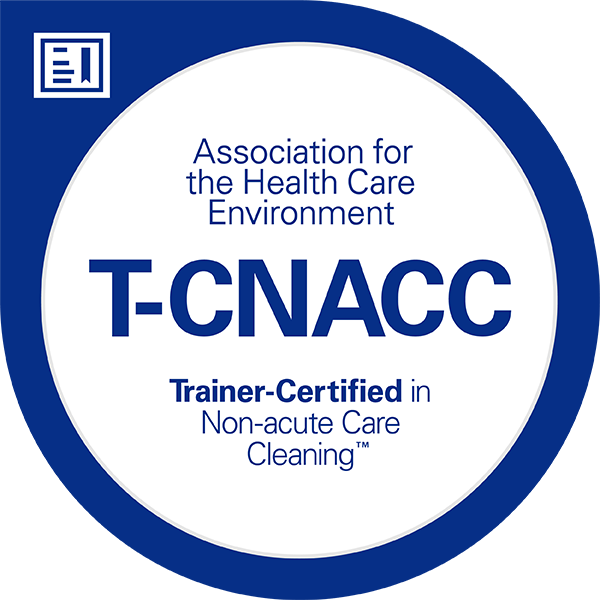
Trainer Certification for Non-acute Care Environmental Services (T-CNACC)
Certificate in Non-acute Care Cleaning
Train-the-Trainer Program (T-CNACC)
The Certificate in Non-Acute Care Cleaning (CNACC) Train-the-Trainer (T3) program equips health care environmental services leaders with the knowledge and instructional skills to train and lead EVS technicians at their organization to become CNACC certificate holders. Participants will earn a T-CNACC designation, required for leading training and proctoring the certificate exam. Become a T-CNACC and share critical pathogen control and disinfection concepts to drive exceptional performance in non-acute care environments.

Expert instruction on cleaning and disinfecting non-acute care areas such as outpatient buildings, clinics, ambulatory centers, and long-term care facilities, and more:
- Best practices and guidelines for cleaning and disinfection of non-acute care areas
- Learn teaching techniques to provide standardized training for EVS technicians
- Practice facilitation skills with live expert feedback and networking opportunities
The T-CNACC program is ideal for leaders who manage technicians responsible for cleaning and disinfecting non-acute care areas:
- Health Care Environmental Services Leaders: Directors, Managers, Supervisors
- Managers of Long-Term Care Centers and other Non-Acute Care Facilities
- Trainers and Educators
- Contract Agencies and Consultants
- EVS Product and Service Providers
- Infection Prevention Professionals
Why should you become a T-CNACC?

Advance operational efficiency by effectively advocating needs with health care colleagues and promoting regulatory compliance.

Identify and adapt cleaning and disinfection techniques to break the chain of infection beyond the acute care settings.

Enhance the quality of care and promote a safe environment in specialized non-acute environments.
Learning Outcomes
The primary learning outcome of this program is for EVS leaders to be prepared to deliver training to their teams using the curriculum listed below and the associated program elements they receive during their training.
Infection Prevention and Control (IP&C)
Review infection prevention and control measures to reduce the spread of pathogens and minimize the risk of healthcare-associated infections.
Interactions with Supervisors and Other Staff
Discuss elements of effective communication and solutions for team problem-solving, and task prioritization.
Chemicals, Equipment, and Supplies
Explain best practices for stocking supplies and handling chemicals, including ‘contact time’, preparing, and labeling.
Outpatient Areas
Review best practices for cleaning and disinfecting, focusing on high-traffic areas considering interactions with the patient and prioritizing safety.
Construction
Communicate the importance of dust and mold contamination, terminal cleaning, inspection, and documentation during construction projects.
Unique Environments
Discuss special consideration in unique environments, like emergency vehicles, mobile clinics, temporary facilities, and more.
Long-term Care
Review cleaning and disinfection techniques to meet the unique needs of long-term care environments, ensuring the comfort and safety of patients.
Behavioral Health Areas
Clarify challenges of behavioral health care cleaning and disinfection methods, considering interactions with the patient, safety, and security.
Program Details
The CNACC Train-the-Trainer program is offered numerous times throughout the year in both in-person and virtual formats. Participants will earn a T-CNACC designation that prepares you to facilitate training for the staff in your department to earn their CNACC certificate.
-
This program includes:
- Facilitator Guide
- Participant Guide
- Toolkit
- Slide Deck
- Notebook
- Certificate of Designation
-
Fees include facilitator guide, participant guide, slide deck, toolkit and designation certificate.
- Member Facility-Based: $950
- Non-Member Facility-Based: $1,150
- Member Non-Facility-Based *Contractors: $1,300
- Non-Member, Non-Facility-Based: $1,500
Become an AHE member to receive the discounted rate. Members save on AHE education, events, online courses and more!
-
Continuing Education Credits (CECs): 24
Credit hours can be used toward the renewal of the CHESP, CHEST, CSCT and CNACC credentials.
Trainers who miss more than 2 hours of the Train-the-Trainer (T3) program will not be eligible to become designated as a trainer until the missed portion is made up at a later AHE offering. This makeup session will require a nominal fee for processing and administration purposes.
Check the calendar for additional offerings.
-
More than 15 business days prior to the start of the Program: Please send your cancellation request to ahe@aha.org. Your refund will be subject to a $300 cancellation fee. 15 business days or fewer prior to the start of the Program: No refund or credit will be issued. No credits, substitutions, or transfers will be permitted under any circumstance.

Upcoming Schedule
Host a Private Program
Can't send your team off-site to get the training they need? Let AHE bring master trainers to your organization to lead a private AHE program for your team. If you have 15 or more participants, learn more by requesting to host a private training at your facility.
Host a Public Program
Don’t have 15 or more to host a private program? Become a public program host. Let AHE bring master trainers to your facility to lead a public AHE program open to all, saving on your team’s travel expenses. Learn more by requesting to host a public training.

Earn a Digital Badge
Gain recognition with a verifiable credential that validates your skills, achievement and knowledge. After completing the T3 training, access the T-CNACC digital badge to share and display on various platforms, like LinkedIn or your digital resume. Badge access is usually emailed to attendees within 2 weeks of completing the T3 program.
TOOLKITS AND GUIDES
Trainer Materials
Access is provided upon successful completion of the T-CNACC program, materials include: slideshows, videos, games and posters.
VIEW MATERIALS »
STEPS TO PROCTOR
Proctoring Exams
Familiarize yourself with the proctoring exam steps to ensure a smooth and efficient examination process.
VIEW STEPS »
Designated Trainer List
Once EVS leaders complete the T-CNACC program, they will become active designated CHEST Trainers and must keep their trainer status current by following the eligibility requirements.
Technician Certificate List
Once the EVS technicians pass the CNACC exam, their name and certificate date will show on the list of CNACC technicians. This certificate does not expire.


